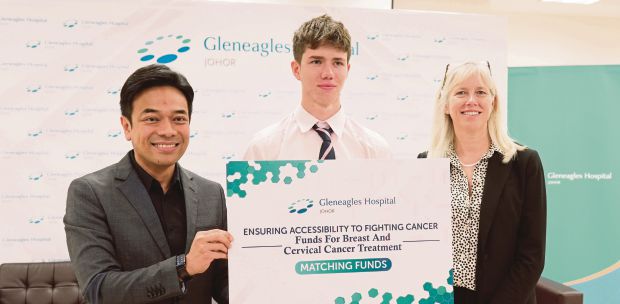BUSINESS Times speaks to Gleneagles Hospital Johor chief executive officer Dr Kamal Amzan on his insights on healthcare sustainability, with laser focus on the fundamental pillars of Patients, People, Public and Planet.
Serving as the CEO of Gleneagles Hospital Johor (GHJ), Dr Kamal emphasised the adoption of strategies by both private and public healthcare sectors that ensure relevance and affordability, while providing top-tier care without imposing financial strain on its patients.
Sustainability in healthcare must progress in step with evolving mindsets and adapt to market dynamics.
While financial stability is important for the success of healthcare organisations, it's essential to also focus on nurturing the broader ecosystem. This includes patients, the public, healthcare professionals and the environment, all integral to sustainable growth.
Prioritising long-term sustainability in this ecosystem means focusing on comprehensive growth rather than just profit.
Overlooking any aspect of this ecosystem can lead to resource shortages and impede progress in healthcare services.
Key to retaining patients is the provision of affordable, relevant, and efficient treatment, Dr Kamal noted.
For healthcare providers to remain effective and responsive, keeping pace with medical advancements is imperative.
Investing in the latest technology and expertise is crucial. This approach ensures healthcare services are not only aligned with current needs but are also prepared to adapt to future developments, paving the way for a resilient, forward-thinking, and sustainable healthcare system.
Patient: Prioritising Speed, Accuracy and Value
Amid rising healthcare costs in Malaysia, hospitals must proactively manage these anticipated surges sustainably.
Dr. Kamal advocates for the healthcare sector to promote early disease screening, emphasising that detecting illnesses early can prevent the escalation of costs that arise when problems are detected late.
In Malaysia, the healthcare sector faces the challenge of evolving in response to the dynamic needs of patients, while upholding the delivery of high-quality care.
Central to this evolution is the critical need to equip medical facilities with the latest technologies and highly skilled personnel.
This advancement is not just about keeping pace with medical innovations; it's about avoiding delays in treatment and preventing the potential harm caused by misdiagnosis.
At the heart of this modernization is the implementation and adaptation of medical technologies.
These tools are more than just equipment; they are enablers of faster, more accurate diagnoses, paving the way for treatments that are both swift and cost-effective.
This approach does not only streamline patient care but also optimises the entire healthcare process.
Moreover, there's a significant emphasis on minimising hospital stays. The benefits of this approach are manifold.
Shorter hospital stays not only reduce the risk of hospital-acquired infections, thereby improving patient outcomes, but also increase healthcare efficiency by liberating crucial resources such as hospital beds and medical staff time.
This, in turn, leads to substantial cost savings for both providers and patients.
Furthermore, enabling patients to recuperate in their own homes not only boosts their satisfaction but also underscores the value of efficient recovery and rehabilitation practices.
Ultimately, this strategy significantly contributes to the nation's productivity, reducing overall sick leave and fostering a healthier, more active population.
People: Cultivating a Premier Workplace
Retaining skilled and reliable staff is crucial, and this requires offering competitive wages and prioritising their welfare.
Dr. Kamal firmly believes that investing in staff leads to greater cost efficiency and supports the growth of the healthcare industry.
A qualified workforce is essential in hospitals to ensure smooth operations. Any shortage of skilled manpower could lead to operational disruptions and negatively impact patient care.
GHJ conducts comprehensive salary benchmarking exercises.
Their goal is to ensure employee wages are at least 80 per cent higher than market rates, aligning with Putrajaya's progressive wage policies. This approach helps attract foreign talent and retain local staff.
GHJ's compensation structure is unique, aiming to set a precedent in the industry for fairness and balance in salary practices.
The hospital's holistic approach sets an example, hoping to inspire other healthcare providers to prioritise their staff's welfare and compensation.
Public: Fostering Healthier Communities
Dr. Kamal integrates a public health perspective into business, keenly focusing on how decisions resonate within society and enhance public healthcare.
He recognises the deeply interwoven relationship between public and private healthcare sectors, viewing them as inextricably linked in a symbiotic bond.
The success or failure of one invariably impacts the other, demonstrating the critical need for mutual support to ensure not just their survival but also their relevance.
On that note, Dr. Kamal gave the example on the crucial role of public-private collaboration in shared Electronic Medical Records (EMRs) and advancing health literacy, such as responsible antibiotic use. These initiatives demand a concerted effort from both sectors.
The implementation of shared EMRs is a prime example of this collaboration.
It is vital for patients moving between public and private healthcare facilities.
Accessible medical records across these sectors prevent the need for private doctors to start over when patients transition, ensuring continuity and quality of care.
Dr. Kamal proposes a national EMR roadmap, a collaborative project that would seamlessly integrate patient records across clinics, government hospitals, and private institutions.
This integration, facilitated by both public and private entities, would streamline healthcare delivery and reduce redundant documentation.
Another area where public-private partnership is crucial is in combating Antimicrobial Resistance (AMR).
Recognised globally as a significant health and economic threat, AMR requires a unified strategy.
The World Health Organisation's warning about the potential impact of AMR underscores the need for collaborative action to prevent drug-resistant diseases from causing 10 million deaths annually by 2050.
To address AMR, Dr. Kamal suggests incorporating awareness into public corporate responsibility programs, uniting public health initiatives with private sector resources and outreach.
This partnership could significantly impact educational campaigns, promoting responsible antibiotic use across communities.
Effective antibiotic stewardship demands education on their prudent use, a responsibility shared by both public and private healthcare providers.
This joint effort can help mitigate the trend of over-prescription and ensure antibiotics' effectiveness for future generations.
Dr. Kamal emphasises that prescribing medication should be a clinical decision, not swayed by financial factors.
"Prescribing medication must remain a clinical decision, guided by need, not by the patient's financial capacity. Access to the most potent or costly antibiotics does not equate to the most appropriate care," Dr Kamal said.
"We must correct this sense of entitlement; it's a matter of proper treatment, not purchasing power." This principle, upheld by both sectors, can prevent a scenario where ineffective antibiotics lead to a surge in hospital admissions for conditions previously manageable in outpatient settings."
The intertwined roles of public and private sectors in healthcare are pivotal.
Their collaboration is essential in shaping a sustainable healthcare system that effectively addresses contemporary challenges like EMR integration and AMR, ultimately benefiting the global community.
Planet: Safeguarding the Environment
"As stewards of healthcare, we must confront the environmental impact of our practices.
"For example, using just one bottle of Desflurane in anaesthesia is as harmful to our planet as driving from KL to Penang 1,000 times. This level of environmental toll is unacceptable.
"I call upon my colleagues in the industry to join us in shifting towards more sustainable anaesthetic options where feasible.
"By doing so, we can collectively lower our carbon footprint and lead the way towards a more responsible, eco-friendly healthcare system," stated Dr. Kamal.
In line with this, the healthcare sector should consider the adoption of Total Intravenous Anaesthesia (TIVA) as an alternative to traditional gas-based anaesthesia when suitable.
TIVA not only reduces emissions associated with gas but also offers patients a smoother recovery, free from common side effects like nausea and drowsiness.
It's imperative that we socialise and integrate such innovative practices as TIVA into our medical community, embracing them as new standards of care.
"We are fortunate to have forward-thinking clinicians in our country who are advocates of TIVA, including our anaesthetists at GHJ," Dr. Kamal remarked.
The healthcare sector must embrace eco-friendly methods that are backed by research and offer long-term benefits.
This shift should be balanced against any additional costs, always keeping sustainability at the forefront.
Medical institutions have a pivotal role in reducing their environmental footprint and adopting innovative, green approaches to patient care.
Revolutionising Healthcare: Navigating Positive Changes
The process of implementing change in healthcare, particularly in well-established practices, presents considerable challenges.
Dr. Kamal observes: "As physicians, we often gravitate towards time-honoured methods, exhibiting caution towards novel approaches. However, the urgent need for environmentally sustainable and financially sensible changes is undeniable.
"The healthcare sector must strike a harmonious balance between honouring its rich traditions and embracing the myriad benefits of sustainable practices, thus charting a course towards a greener, more economically viable future."
A key aspect of this transformation involves the considered shift from branded to generic drugs.
Dr. Kamal remarks: "Transitioning to generic drugs is an important strategy, but it's just one facet of our comprehensive approach to sustainable healthcare.
"Not all medications can be replaced by generics, and each decision should be made with the patient's needs in mind. This move, centred on efficacy and affordability, reflects our commitment to high-quality care within a sustainable healthcare model."
This approach to medication choice is part of a broader strategy to enhance healthcare sustainability.
"It's about a holistic vision for healthcare, where decisions, whether about medication or other practices, contribute to overall sustainability and patient well-being," explained Dr. Kamal.
In this broader strategy, the well-being of healthcare professionals also plays a critical role.
Dr. Kamal emphasised: "Policymakers need to ensure that the healthcare environment supports both patient care and the well-being of healthcare workers. This includes fair wages and positive work conditions, which are essential for the delivery of high-quality healthcare services."
He further stressed the importance of foresight in policy-making.
"Long-term thinking is crucial in policy development to prevent widening the gap in healthcare accessibility between different socio-economic groups," Dr. Kamal stated.
"This includes not only regulations around medication and treatment but also ensuring that our healthcare workers are supported and that preventive care measures are prioritised to reduce the burden on our healthcare systems."
In conclusion, Dr. Kamal underlined: "The move towards preventive healthcare is integral to our strategy. By focusing on prevention, we can significantly reduce the incidence of preventable diseases, lightening the load on healthcare systems and ensuring a sustainable healthcare future for all."






